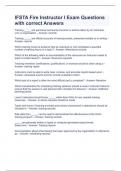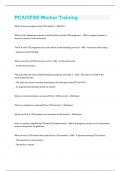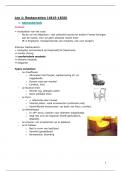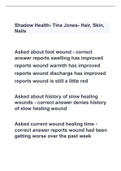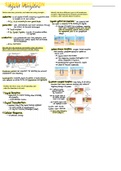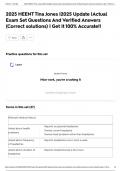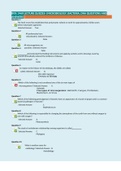Week 2—Inflammation & Allergy, Bone & Joint, Anti-Infectives Inflammation & Allergy Natural vs. Acquired Immunity ●
Natural—innate, native o
First and second line of defense o
present before exposure to infectious agent o
non-specific o
Physical barriers, Phagocytic cells, NK cells ●
Acquired o
Third line of defense o
present after first exposure to antigen (non-self) o
specific, diverse o
fades over time w/o stimulus o
Breast milk, vaccines o
receptors bind to specific antigens o
More efficient and stronger after each exposure o
T lymphocytes (made in the thymus; attack target cells) and B lymphocytes (made in the bone marrow; make antibodies) o
Cell-mediated—targets attacked directly by cytolytic T cells and macrophages o
Humoral—mediated by antibodies (a.k.a. immunoglobulins or gamma globulins) dissolved in the blood ▪
Five Classes of Antibodies ●
IgA—GI tract and lungs, breast milk ●
IgD—antigen recognition on B cells ●
IgE—allergies (release of histamine) and parasitic worms; on mast cells ●
IgG—major antibody in blood; target-cell lysis, phagocytosis; transferred across placenta; passive immunity ●
IgM—target-cell lysis; antigen recognition on B cells Active vs. Passive Immunity ●
Active—acquired o
Infection or vaccine o
Antibodies o
Long-term o
Remembers antibodies ●
Passive—Preformed antibodies o
Placenta to fetus, Breast milk, Antibody infusion o
Short-term Inflammatory Response ●
Triggered by trauma or infection ●
S/S: o
Erythema o
Warmth o
Edema o
Pain o
Clots w/bleeding o
Discharge w/infection o
Fever w/infection Immunizations (Vaccines) ●
Types o
Live-attenuated → do not give to immunocompromised patients ▪
MMR, Rabies ▪
Most dangerous but also most effective ▪
Must be refrigerated o
Inactivated ▪
Hep A, Hep B ▪
Most common o
Toxoid ▪
Tetanus, Diphtheria ▪
Bacterial toxin changed to nontoxic o
Conjugate ▪
Polysaccharide coating on virus is conjugated ●
Complications o
Precautions ▪
Immunocompromised ▪
w/ radiation therapy or glucocorticoids o
Contraindications ▪
Hypersensitivity (anaphylaxis) ▪
Sick pt’s (moderate to severe) Immunosuppressants ●
Inhibit immune response ●
Why would we use these? o
Transplants → to lower r/o transplant reaction o
Autoimmune dz (long-term) → to suppress the immune system and prevent progression of disease ●
Complications o
Risk of infection o
Risk of neoplasms → bc the body by suppressing IS is also lowering its abilities to fight problems/ cancerous cells ●
**Cyclosporine (calcineurin inhibitor) o
Use: Organ rejection, autoimmune dz o
MOA: IL-2, interferon gamma, cytokine suppression →
inhibits B and T lymphocytes o
AE:
nephrotoxicity, infection
, hepatotoxicity, lymphoma, HTN, tremor, hirsutism, gingival hyperplasia, gynecomastia, hyperkalemia, can also decrease the effectiveness of oral contraceptives o
Interactions: Grapefruit juice, Repaglinide, CYP3A4 inhibitors (ketoconazole, erythromycin, amphotericin B)/activators (phenytoin, phenobarbital, carbamazepine, rifampin), nephrotoxic drugs (aminoglycosides, NSAIDs) o
Alternative: tacrolimus ●
**Glucocorticoids/corticosteroids o
Prednisone/prednisolone o
Suppress immune responses, inflammation ▪
RA, SLE, IBD, other inflammatory disorders ▪
Allergies, asthma o
Prevent rejection o
Modulation of
glucose
metabolism, suppresses vasoconstriction o
SE: metabolic,
incr BG
,
decr BP
, reduced muscle mass, decr protein matrix of bone, thin skin, lipolysis,
redistribution of fat (potbelly, moon face, buffalo hump) o
AE:
hypernatremia (trying to increase BP so retaining NA), hypokalemia (massive increase in K excretion)
, edema (from vasodilation),
adrenal insufficiency (long-term),
osteoporosis,
infection
,
hyperglycemia, glycosuria
, myopathy, psychologic disturbances, cataracts, glaucoma, PUD, Cushingoid syndrome → so basically long term GC use leads to VARIOUS AE o
Contraindications: Pt’s w/systemic fungal infections, live virus vaccines → bc they may not be able to respond properly to these interventions d/t suppressed IS o
Precaution: peds/pregnancy/breastfeeding o
Interactions: NSAIDs, insulin, vaccines → monitor for signs of infection like fever, sore throat and productive cough o
TAPER
!!! → abrupt withdrawal of GC can lead to addison's disease r/t adrenal insufficiency ●
Cytotoxic Drugs o
Methotrexate, Azathioprine, Mitoxantrone o
Non-specific o
Kill T- and B-lymphocytes o
Adverse effects ▪
Bone marrow suppression (neutropenia, thrombocytopenia) ▪
GI disturbances ▪
Reduced fertility ▪
Alopecia ●
Antibodies o
Basiliximab, lymphocyte immunoglobulin o
Prevent rejection after renal transplantations o
AE: hypersensitivity reactions Antihistamines ●
Histamine o
Locally acting compound o
Allergic disorders (acquired immunity) and peptic ulcer dz (PUD)






